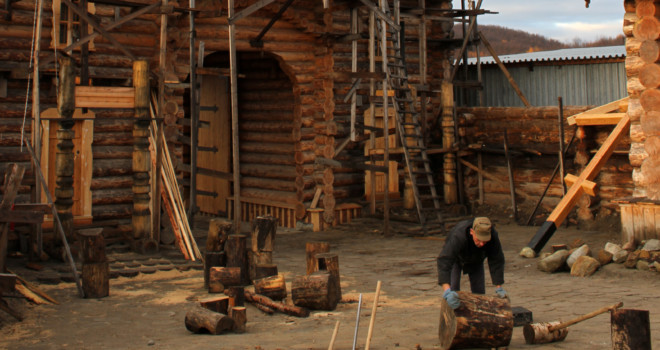“Stand firm, then, my beloved brethren, immovable in your resolve, doing your full share continually in the task that the Lord has given you, since you know that your labor in the Lord’s service cannot be spent in vain” (1 Cor. 15:58).
 Let us look at work now from God’s point of view — God, Who is a witness of our work, and in Whose presence it is carried out.
Let us look at work now from God’s point of view — God, Who is a witness of our work, and in Whose presence it is carried out.
All this so-called work of ours is not actually our work at all. For we can only call “ours” what belongs to us fully and unconditionally, what depends on us and is directed toward us.
Now our work does not belong to us wholly. For even in the most personal work we use powers and strength that are given to us by God, the Creator of nature. This work does not belong to us, for its character is not only personal but social as well. Neither can we wholly divert our work toward ourselves. So when we speak of “our work” we are allowing ourselves some exaggeration. It is rather a simplification of our thought than a literal expression of the truth.
The toil of human work is cooperation with God
The following words recall this fact:
“Work at all your tasks with a will, reminding yourselves that you are doing it for the Lord, not for men; and you may be sure that the Lord will give the portion He has allotted you in return” (Col. 3:23-24).
God is the cause of all creation and the giver of strength and energy for work. He also directs human energies toward the plans He had established in the act of creation. God has called us to cooperate with Him, and granted us appropriate powers, abilities, and the initial preparation for work. He still governs the world that He has created, and carries out part of His government with the help of man.
The Creator guides the world toward the goal that He has assigned to it. Only He knows the world fully and has its complete image in His mind. He sees its final perfection. For the achievement of this perfection the Creator guides the activities of the masses in their millions, whom He animates with the will of cooperation.
Around us we see the immensity of creation and the immensity of the work that has been done. In the face of all the work performed in the world we feel like a man who unexpectedly finds himself in a factory full of machinery. He becomes dazed, seeing all the dizzy movement and impetus of transmission belts transferring energy, and hearing all the noise and the whirring. It makes him uneasy; he feels helpless and powerless. He has to be led into the mystery and purposefulness of all this effort.
The created world is God’s workshop
God’s world works in peace and quietness. But when one really penetrates this work, one feels continuous movement, the transmission of energy and of the powers of nature. We admire the greatness of the forces at work, their splendor, their arrangement and interrelation, their planning and order. We stand astonished at the threshold of God’s workshop. We need someone to take us by the hand and explain the process and intention of all this commotion.

This article is from Sanctify Your Daily Life. Click image to learn more.
We look at God’s work in too profane a manner. We take in the external phenomena of work and do not perceive the thought or guiding hand behind it. And all the while “the spirit of the Lord hath filled the whole world” (Wisd. 1:7).
The world is filled with the voice of God. Everything lives by God’s activity. God’s thought and intention can be recognized here. A moment’s close examination reveals this thought to us, this great diversity and wonder of God’s activity in the world. These are not “blind forces,” as we are accustomed to say. They are all controlled by God and brought toward Him in a full and complete manner.
In the act of creation we see the divine thoroughness. There is nothing shoddy or intermittent here. Everywhere there is an abundance of the real perfection that things should have: “God’s works are perfect” (cf. Rev. 15:3). God has displayed this perfection before our eyes as if He wanted to say, “Go and see how I work.”
The created world is a living example, lesson, and education for us. The very sight of its creatures has an educational effect, for we admire in them the complete perfection of God’s activity.
God does not merely aim at purely useful work but is mindful of beauty and decoration — there is aestheticism in what He does. Everything brings home to us the beauty with which God ornaments the works He has created. It is not only the heavens that tell of God’s glory (Ps. 18:2). We see it in the tiniest creature here on earth. This beauty has to hold our attention; it has to compel us to meditation.
But it does not end there. Man is called to more than mere admiration of God. God has called us to cooperation. “Away with you to the vineyard like the rest” (Matt. 20:4). The world and everything that happens in it is God’s vineyard. We must take a share in the Creator’s work.
Our work helps complete God’s work
Man is in God’s service. When God says to us, “Fill the earth, and subdue it” (Gen. 1:28), He is, in this way, binding us to the earth and at the same time obliging us to work and cooperate with Him, so that the earth will really be subject to man, and through man, to God.
Man has to act according to God’s plan; he has to perform what God has in mind for him. It is important therefore to remember in work that we are in God’s service. It is important for us to know God’s plan.
Human work is, moreover, a further stage of God’s creative work; it is the process that completes the act of creation. God conceived the world in such a way that He gave us in enormous measure the power of taking the act of creation one stage further toward that degree of perfection that He had in mind. Although God’s own acts are perfect in themselves, it is necessary, if they are to be used rightly, to prepare them for their own proper use. And here there is room for man to share in the further shaping of God’s activity.
The world is perfect in itself, but without the work of man it would not achieve its aim. It would not attain the measure of perfection proper to itself; instead, it would change into a jungle or a wild desert.
The earth calls for human work
The earth requires human work to reveal its real face. Our poor emigrants were spreading civilization when they cleared away the immemorial forests of the New World. These are the forms taken by the nonstop progress of the man of action. Thanks to the will to work, man is always seeking new territories for his activities.
Admittedly, some say that the world is being choked by too many people, but God alone knows how far from completion the plan for the conquest of the whole earth still is. And it is God alone Who knows all the possibilities of the earth; He sees it “all clothed in readiness, like a bride who has adorned herself to meet her husband” (Rev. 21:2). And therefore God still maintains the law of life in man, the will to pass life on, knowing well that the wanderings of nations will conquer more and more stretches of land, will bring them into civilization, continually fulfilling the command “Fill the earth, and subdue it” — the whole earth, with all its seas, mountains, and deserts.
The world in God’s thought must undergo a further transformation with the help of human work carried out in the name of this same command, “Fill the earth, and subdue it.” It seems to us that this is the commandment that people keep most faithfully. Even if they have rejected all the other commandments, in their work of conquering the earth they will always acknowledge the eternal sovereignty of God over the world and display obedience to the will of God.
Man must prepare the earth for human life and for God
Man must humanize the earth to prepare it, so that it is really worthy of its Creator and suitable for human life. Only when the face of the earth is stamped with the imprint of man’s work does it become worthy of God, for it is man alone who is called to restore the earth to God.
The Creator gets back the glory due to Him from the earth, when it is civilized and filled with good and faithful servants — His children.
The Creator wants the world to be populated and filled abundantly: “Increase and multiply and fill the earth” (Gen. 1:28). There will be more workers for the earth then, and more worshippers for God. The more work is done on the earth, the more possibilities of life there are on it, the more room for new people, the more means and goods to support life. And thus the world will be filled with peoples and nations.
Work makes possible our abundant population
And for what? Oh, we are insatiable! For we would be glad to see every day more sons of God praising their Creator, thanking Him for their daily bread, for their divine sonship, for the kingdom of Heaven, for immortality, for “life everlasting,” which is to be filled with happiness without limit. We want this! We demand great numbers of people, because every human life means one more eternal happiness, one more man knowing real joy, one more infinite love of God.
We not only want people for the earth, in order to show the whole beauty and power of God’s creation through their work, but we want people for Heaven also. And there is so much room in Heaven! Whoever has an open heart, and loves God without reserve, is not afraid of new people, of children, cribs, or the abundant population of the earth. He wants as many people as possible so that Heaven may one day possess its “millions of millions.”
Here we are already thinking of the future glory of God. We think of this joy that is in waiting. We want God’s plan to be completed here below.
And therefore abundant population does not terrify us, for every person is a son of God and His worshipper. If one has faith in God’s Providence and in the wisdom of creation, one is confident that God is preparing a splendid place for every one of those sons and that there will never be any shortage of bread. This will encourage in us the will to work, and will stimulate effort and thought, so that we can cooperate with the Father of creation in the task of feeding the human race. The Catholic will in life is the will to work; it is the source of progress in the world, and of the further development of civilization and culture.
By cooperating with God, man adds, through his work, new values and possibilities to creation. The population of almost twelve million people that lived in pre-partition Poland did not have any better conditions of life than we have today, when, within far more limited boundaries, there are twenty-eight million. How many new and valuable properties have we found in our soil in the course of the last few centuries, how many proofs of God’s generosity and goodness! We are continually taking new riches out of the earth, and discovering possibilities of even further development.
By adding new values to created things, we try to earn God’s praise for ourselves “as a workman who does not need to be ashamed of his work” (2 Tim. 2:15). We fulfill this task by grasping God’s intention fully and recognizing His goals. In every work we must, with the help of our rational nature, sense what God intends in His work of creation, so that we may harmonize the rhythm of our work with God’s.
And God intends “to give them their food at the appointed time” (Ps. 144:15). He intends, with the aid of human hands, to fill the earth with good things; He intends to demonstrate His love for the world in an even higher and more perfect degree; He intends to unite us all in brotherly love, and to make us combine in work and comradeship; He intends to achieve the fullness of His glory through our work, and to bestow on us the fullness of eternal happiness.
When we grasp God’s intentions and cooperate with Him, the heaviest work loses some of its burden; our face, beaded with sweat, lights up in a smile: “As the eyes of the handmaid are on the hands of her mistress, so are our eyes unto the Lord our God” (Ps. 122:2).
Work takes on nobility, sublimity, and dignity. Even the dirtiest work becomes the service of God. God did not lessen His glory when He bowed down to the dust of the earth and took Adam from it. The lowest work bears the marks of humanity and of the sonship of God.
There is no intelligent, purposeful, and useful work that does not have this aspect of nobility. Wherever man is working — whether it be in the mine, on the land, in the kitchen, or in the factory — he is in contact with God’s gifts; everywhere he perceives some radiance of God’s love.
Work, understood in this way, brings us back with new faith to God, and justifies us by deeds. We understand that man is usually justified by deeds done in the light of faith. For here we do our “full share continually in the task the Lord has given us. . . . Labor in the Lord’s service cannot be spent in vain” (1 Cor. 15:58).
Editor’s note: This article is from a chapter in Sanctify Your Daily Life, which is available as a paperback or ebook from Sophia Institute Press.
 Let us look at work now from God’s point of view — God, Who is a witness of our work, and in Whose presence it is carried out.
Let us look at work now from God’s point of view — God, Who is a witness of our work, and in Whose presence it is carried out.







